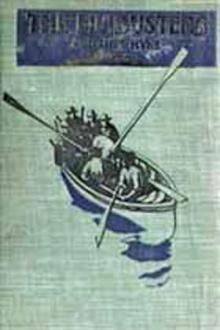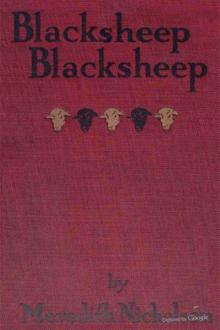The Filibusters - Charles John Cutcliffe Hyne (best english books to read for beginners .TXT) 📗

- Author: Charles John Cutcliffe Hyne
- Performer: -
Book online «The Filibusters - Charles John Cutcliffe Hyne (best english books to read for beginners .TXT) 📗». Author Charles John Cutcliffe Hyne
I glanced back. The old man in the patio was staring after us in wonder. When he flaunted his principles with that crazy piece of daring, he had expected a platoon in reply, and (as I afterwards heard) hoped to fittingly close a life of recklessness. The cold ignoring of his anger struck him like a blow; the wooden discipline of the filibustering troops awed him; and his allegiance to President Maxillo dropped from that very minute.
At two other points down that avenue were we fired upon, once from the shadow of a side road, once from what appeared to be an unoccupied house. To neither did we return any notice, though at the last discharge a bullet hummed through Coffin’s pith helmet, but tramped stolidly on up a gentle gradient; and saw on the downward side the harbour and the business part of the town twinkling with lights and activity.
Los Angeles was very much alive to our invasion, and behind us we could hear at times brisk firing. Apparently both Carew and Fluellen were being attacked, though with what fortune we could not tell. But they had our best wishes for success. It meant nothing short of annihilation to us if they failed to gain their positions and do the work allotted to them by the appointed time.
The moon fell when we came to the end of the avenue, and the night grew darker. The cableline had ended with a sweep; the ground underfoot yielded a crop of sun-dried ruts; the road began to lead with petulant zigzags up a steep mountain flank. High above us a bugle shrilled out a call.
“That is our point,” Briggs said in his cool voice. ” The fort up there is the key to the whole position, and we have got to take it.”
“Or die trying,” said Davis.
“Oh, no,” replied the General; ” take the place, my dear fellow. That is much better. I prefer in a vital case like this to make up my mind for success. It is much pleasanter, and always more profitable.”
“By Jove, yes,” said Coffin. ” A man who thinks he may lose at a bluff game never wins. There’s only one thing I’m discontented about, and that’s this infernal marching. Nature never intended me for a footpad. General, dear, as a man who knows the district, couldn’t you recommend me to a convenient spot where I could lift a piece of horse-flesh?”
“Cavalry can’t storm forts,” said the General. “But when we have got that duty off our hands, I’ll mount you, next thing. Whew! listen to that.”
“Fluellen is getting it,” said I. ” There’s hot firing going on in his direction.”
“Fluellen is giving it, I fancy,” returned the General drily. ” He has got two of his guns in action, and ah! There is ‘ cease fire both.’ He’s cleared the coast behind him, and on he goes again. What time is it? Four o’clock. He’s running it very close. He ought to be at the foot of that Devil’s Crag by now, and he’s a mile from there still, but if he isn’t stopped again he’ll do it yet.”
All this time we had been marching between heavy walls of timber, the trees so matted with linas and undergrowth that without a machete a man could not have struggled a mile in a day. The foliage on the lower parts of the hill masked us effectually from any watching eye in the fort above; but as it grew in height, so it thinned; till the crest, which was shaped curiously like the cranium of a man, lay completely bald, save for a downy growth of tussock grass. Out here, on the middle of the forehead (so to speak) the fort squatted like some uncouth beetle; and at the back, a mile away, the Devil’s Crag loomed up black against the night sky.
It was not our object to be viewed too soon. The stronghold was a place of prodigious strength, and only by a sudden attack on the weakest and most unexpected point could we hope to carry it by storm. So when the cover thinned, we left the main road and turned off down a narrow trail which led along the edge of the tonsure.
The attack was arranged for the break of day. Fluellen with his guns on La Nuca del Diabolo was to open the ball by a furious fire from above into the heart of the fort. Under the cover of this, Carew was to break ambush and storm the angle of the back which lay nearest him, whilst simultaneously with him Coffin was to escalade the opposite corner.
There had been a little margin allowed for delay on the road, though not much. In our case, having been hindered by nothing at all, we found ourselves on the spot half an hour too soon, But the delay was not without its advantages. The march had been at a brisk pace, and much of the ground was rugged and steep. Many of the men were blown and leg-weary. So we advanced cautiously to the edge of the fringe of cover, and there lay down silently on our arms to rest and bide the time.
The men were very willing in their effort at keeping the silence, but absolute noiselessness was beyond their power. All around me I could hear the rustle of breathing, and the faint creak of moving limbs. There were besides the hums of mosquitos, the swishings of jar-flies, the chatter of katydids, and the other night sounds of the forest; so that it was not easy to pick up smaller sounds. I could make out the movement of brisk life in the fort, but not so much as a whisper told of Carew’s advance, and from the towering Devil’s Crag came the silence of a monument.
So we lay when the higher clouds in the east began to redden in prophesy of the dawn, and then an alarming thing happened. From out of the earth, so it seemed, in our midst there suddenly rose a man, mother-naked; who ran in zigzags amongst the resting troops, and stabbed with a long lean knife at any hand which made a clutch for him.
Someone he had wounded drew and levelled a revolver.
“Any man who fires,” said the General, in his quiet, carrying voice, ” I will shoot with my own hands. Pluck the legs from under him; give him the steel.”
The Indian dodged like a football player; his limbs were greased; he was with us one instant, the next he was through our line and racing for the fort.
The General looked at his watch. Then he stood up and drew his sword. ” When that fellow gets in with his news they will slew guns over here and start shelling us at once. Fluellen and Carew certainly are not up; but I do not see that we have any choice left us other than to attack at once. I shall have the honour, gentlemen, of leading you myself, and I shall be very much disappointed if we are not inside that fort within ten minutes. It is the key to Los Angeles, and with Los Angeles we can unlock Sacaronduca.”
“Fall in there,” said Coffin. ” Now, boys, the fewer there are to share the more there is to get. Come along, now.”
The men had heaved themselves on to their feet and edged up into line. They yelled out a cheer, and then came a groan or two and one vivid shriek. The fort had seen us, and a hundred men with rifles resting on the wall had already opened fire.
The General sprang out for the foot of the concrete walls a dozen paces ahead of any of us; we others followed at the run, and I owned that it seemed to me impossible that one man of the whole lot could by any chance be alive ten minutes later on.
NOW, to explain matters which had a great influence with our efforts upon Sacaronduca, it is needful at this point to put in a plainer account of some relationships which so far have been only touched upon very lightly.
Humanly speaking, the whole of the events recounted in this book owe their start to one young lady having unusual liberty of action granted to her at an extremely youthful age. Her father was a Sacaronducan, who made money in the country out of gem and gold mines, and was shrewd enough to store it elsewhere. Her mother was a lady of Co. Fermanagh, educated in Paris, and so pinned down by rule during the days of youth that life was made a torment to her. The pair of them lived a married life that was not altogether idyllic, nor completely miserable, nor at all ordinary; pleasantly varied, in fact; and all were sorry when it came to an end. Monsieur le pere died first of a rifle shot in one of the periodical revolutions. Madame inherited all his enormous wealth, on the one condition of residing in Sacaronduca, a country she loathed. During the next six years she bewailed this tie without ceasing; and, regarding the matter in the abstract, expended a very pretty talent in invective solely on the subject of human restrictions in the bulk; after which time she joined her husband, and left a most consistent will. Delie Alicia, the only daughter, was to inherit without stint; and though law insisted that the property should be held primarily by trustees, Madame so contrived that these should be the merest figureheads.
There are beyond doubt a vast legion of other young ladies of fifteen who would consider it the ultimate earthly bliss to find themselves supreme mistress of an income of �80,000 per annum, derived from sound investments; and it is a very probable thing that were they to have their wish and put a little enterprise into the handling of it, the great majority of them would come to the worst kind of grief. But Miss Delicia’s previous education had been peculiar. She had a very shrewd notion of taking care of herself; so that, although the track of her progress was usually marked with a series of moral earthquakes, minor and great, she, Delicia, always kept upon her feet.
There is no place here for Miss Delicia’s earlier escapades in full; besides, another man is writing them in another place. One alone of her thousand freaks demands mention, and that is her invasion of Ireland.
She descended upon that country of her mother in a whirlwind of liveliness and Parisian clothes, and she took Dublin and Ulster by storm. She eclipsed all the other women, but even they loved her, which is certainly the most generous certificate which could be given to anyone. They seemed to take it quite as the right thing that all their men-kind should propose to Delicia if they were clever enough to get her for three consecutive minutes ” en tete-a-tte.”
She proved herself handy in many ways. She drove a tandem of two Arab polo ponies unbroken to harness in the front of a car, and kept out of many tempting wayside ditches. She steered a notably unlucky





Comments (0)